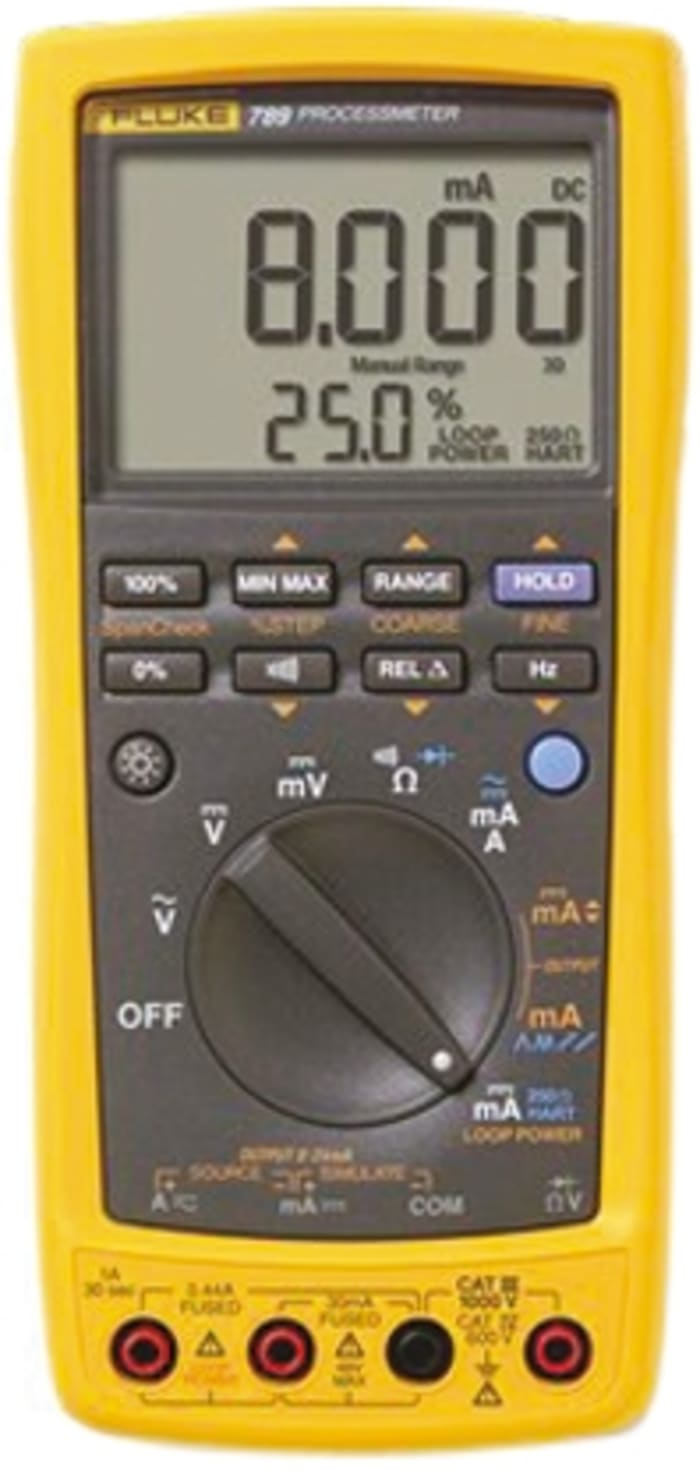Technical Document
Specifications
Brand
FlukeMaximum Voltage Measurement
1000V ac
Maximum Current Measurement
1A ac
Battery Life
140 h
Battery Type
AA
Power Source
Battery
Dimensions
203 x 100 x 50mm
Weight
610g
Height
50mm
Length
203mm
Maximum Operating Temperature
+55°C
Minimum Operating Temperature
-20°C
Model Number p
789
Width
100mm
Country of Origin
United States
Product details
Fluke 789 ProcessMeter™
Combining the functionality of a current loop calibrator with the power of a digital multimeter, Fluke's 789 also has the wireless capabilities of Fluke Connect with the IR3000FC module.
Featuring a larger display than the Fluke 787B, it has 2 levels of back-lighting making it twice as bright and easy to read. With a built-in 250 ohm HART® resistor, the need to carry a resistor separately has now been eliminated, and a separate power supply is no longer needed with the 24 volt loop supply. This cleverly designed instrument now allows technicians and engineers to do a lot more in one handy tool. The perfect addition to any test kit for measurement and troubleshooting.
Features and Benefits:
• Displays mA and % of scale simultaneously
• 0.1% dc voltage accuracy
• 0.05% dc current accuracy
• 1200 ohm drive capability on mA source
• 0% and 100% toggle between 4 and 20 mA sourcing
• -20°C to 55°C operating temperature
• 140 hours typical (measurement), 10 hours typical (sourcing 20 mA) battery life
FAQ's
What is a current loop calibrator?
Current loop calibrators are specially designed instruments for current loop trouble shooting, testing and calibration. They can source current on unpowered devices in a loop, simulate the operation of loop powered transmitters and also measure current. These calibrators often feature time saving technology, specialist graphics using digital interfaces and micro-processor based electronics.
How much current flows in each loop of a parallel circuit?
Determined by Ohm's law, which states that the current between 2 points through a conductor is directly proportionate to the voltage across those 2 points, divided by the resistance of the conductor. I = V/R. This is also the case for series and parallel circuits, however in parallel circuits the total current can be affected by the way the resistors have been connected, as well as their ohmic value. Current does divide up and there can be more current in one area over another nonetheless when all areas are added up the total amount is the same.

Stock information temporarily unavailable.
P.O.A.
Calibration type
No Calibration
1
P.O.A.
Stock information temporarily unavailable.
Calibration type
No Calibration
1

Technical Document
Specifications
Brand
FlukeMaximum Voltage Measurement
1000V ac
Maximum Current Measurement
1A ac
Battery Life
140 h
Battery Type
AA
Power Source
Battery
Dimensions
203 x 100 x 50mm
Weight
610g
Height
50mm
Length
203mm
Maximum Operating Temperature
+55°C
Minimum Operating Temperature
-20°C
Model Number p
789
Width
100mm
Country of Origin
United States
Product details
Fluke 789 ProcessMeter™
Combining the functionality of a current loop calibrator with the power of a digital multimeter, Fluke's 789 also has the wireless capabilities of Fluke Connect with the IR3000FC module.
Featuring a larger display than the Fluke 787B, it has 2 levels of back-lighting making it twice as bright and easy to read. With a built-in 250 ohm HART® resistor, the need to carry a resistor separately has now been eliminated, and a separate power supply is no longer needed with the 24 volt loop supply. This cleverly designed instrument now allows technicians and engineers to do a lot more in one handy tool. The perfect addition to any test kit for measurement and troubleshooting.
Features and Benefits:
• Displays mA and % of scale simultaneously
• 0.1% dc voltage accuracy
• 0.05% dc current accuracy
• 1200 ohm drive capability on mA source
• 0% and 100% toggle between 4 and 20 mA sourcing
• -20°C to 55°C operating temperature
• 140 hours typical (measurement), 10 hours typical (sourcing 20 mA) battery life
FAQ's
What is a current loop calibrator?
Current loop calibrators are specially designed instruments for current loop trouble shooting, testing and calibration. They can source current on unpowered devices in a loop, simulate the operation of loop powered transmitters and also measure current. These calibrators often feature time saving technology, specialist graphics using digital interfaces and micro-processor based electronics.
How much current flows in each loop of a parallel circuit?
Determined by Ohm's law, which states that the current between 2 points through a conductor is directly proportionate to the voltage across those 2 points, divided by the resistance of the conductor. I = V/R. This is also the case for series and parallel circuits, however in parallel circuits the total current can be affected by the way the resistors have been connected, as well as their ohmic value. Current does divide up and there can be more current in one area over another nonetheless when all areas are added up the total amount is the same.


